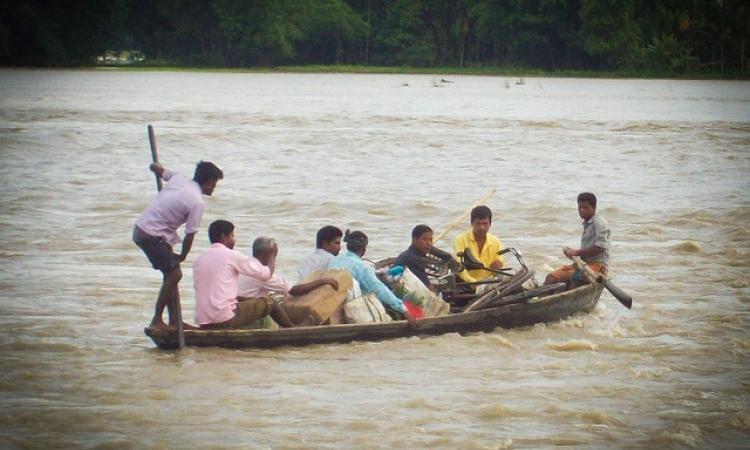
Flood batters three northeast states, Assam worst affected
According to the Assam State Disaster Management Authority, over 24.19 lakh people from 2,323 villages and localities across 24 districts are reeling under the flood, with the death toll rising to 87 in the state. Major rivers such as Brahmaputra, Dhansiri, Jia Bharali, Kopili, Gaurang, Kushiyara and Sankosh were flowing above the danger level at several places. The situation is no better in Arunachal Pradesh and Meghalaya. According to official sources, five people lost their lives in Meghalaya while an estimated one lakh others were affected. The floods have also created havoc in Kaziranga National park, where 116 animals including 11 rhinos, have died due to drowning and vehicle hits. As per the administration, NDRF has positioned 122 teams across the country to tackle the flood and heavy rain situation. (The New Indian Express)
Bridge collapses, embankments breach during floods in Bihar
A small bridge that connected Gopalgang to Chhapra and other districts was washed away by a swollen Gandak river last week. The bridge, worth Rs 264 crore, was constructed in eight years and collapsed in 29 days of its inauguration. As per engineers, the collapse could be attributed to either not taking into account the levels of rise in Gandak river during floods or the poor quality of work. Similarly, an embankment built on the Bagmati river for the construction of a dam at the Belwa area of Piprahi in the Sheohar district was damaged due to heavy water pressure. (The Print, Livemint)
Crop cultivation to get a boost this year, thanks to excess rains and return of migrants
As per the Indian Meteorology Department (IMD) data, the South-west monsoon brought excess rain to all states except Kerala, Himachal Pradesh, Tripura, Mizoram and the four hill districts of Karnataka. As 88 percent of sowing is already completed in the country, the agricultural experts believe that on-time rain, hike in Minimum Support Price (MSP) and the return of millions of people to their villages due to lockdown are the main reasons behind this. While sowing of paddy sees a boost, the sowing of pulses and millets have also increased from last year. Along with this, the overall sowing has so far been done across 432.97 lakh hectare of agricultural land as against 202 lakh hectare, last year. (News 18)
Gujarat government approves signing of MoU for four aerodromes
The Gujarat cabinet has given its approval to enter into a tri-party agreement for the construction of four water aerodromes under the regional connectivity scheme. The MoU will be signed by the Gujarat government, Union Ministry of Civil Aviation and Airports Authority of India. The latter will be the implementing agency that will guide the government in formulating the design. The proposed aerodromes are expected to come up at the Sabarmati riverfront in Ahmedabad, Sardar Sarovar dam at Kevadia in Narmada district, Shetrunji dam at Palitana in Bhavnagar district and Dhaori dam in Mehsana district. (Outlook India)
Haryana asked to preserve water bodies and stop effluent flow in Western Jamuna Canal
With an aim to ensure improvement in recharge mechanism, the Punjab and Haryana High Court has directed Haryana to revive, preserve, conserve and protect all water bodies in the state. The direction has come following the petition filed that challenged an earlier order to panchayats in Kurukshetra for replacement of paddy by other crops for checking groundwater depletion. In another order, the Irrigation and Water Resources Department has sent notices to four departments asking them to stop the flow of domestic effluents into Western Jamuna Canal (WJC). Domestic effluents, including sewage and water from sewage treatment plants (STPs), villages and urban areas in the district are dumped into the WJC at 21 places. (The Tribune)
This is a roundup of important news published between July 8 - 20, 2020. Also read policy matters this week.
/articles/bihar-and-northeast-india-reel-under-floods-assam-worst-hit